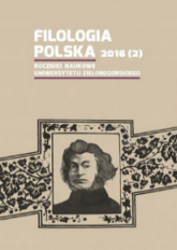The Slavic crusade of Mickiewicz
Keywords
Abstract
The author of the article attempts to describe selected elements of Mickiewicz’s biography, as well as those fragments of his literary output which arrange themselves into a common tale of Slavdom. Among the selected texts there are the Paris talks, The composition of rules for the Polish Legion [Skład zasad legionu polskiego], Mickiewicz’s speeches made to the inhabitants of Italian cities at the time of the Spring of Nations in 1848 and his travel letters. Reconstruction of Mickiewicz’s activity at that time, accompanied by his Eastern mission of 1855, reveals his Slavophile tendencies flavored with millenarian attitude. Symbolic imagery rooted in an atmosphere of medieval crusades and the search for Slavic Jerusalem seems to have been close to the atmosphere of those events. In this perspective, the death of Mickiewicz in 1855 concluded and complemented his many years of efforts to restore the Slavs to history. As a result, the symbolic and mythical image of Mickiewicz’s struggle for free Slavs found its way to the minds of the general public. However, for contemporary and subsequent interpreters, the literary events and the biographical facts seemed to be the most complementary tale from the life of the romantic poet.
References
Krasiński Z., Listy do Augusta Cieszkowskiego, Edwarda Jaroszyńskiego, Bronisława Trentowskiego,oprac. i wstępem poprzedził Z. Sudolski, t. 2, Warszawa 1988.
[Google Scholar]
Kuziak M., Wielka całość. Dyskursy kulturowe Mickiewicza, Słupsk 2006.
[Google Scholar]
Ławski J., Mickiewicz. Mit – historia – studia, Białystok 2010.
[Google Scholar]
Mickiewicz A., Listy. Część trzecia i czwarta, Wydanie Rocznicowe, tekst oprac. M. Dernałowicz, E. Jaworska, M. Zielińska, t. 1617, Warszawa 2004-2005.
[Google Scholar]
Mickiewicz A., Literatura słowiańska. Kurs trzeci, Wydanie Rocznicowe, oprac. J. Maślanka, t. 10, Warszawa 1998.
[Google Scholar]
Mickiewicz A., Skład zasad, [w:] idem, Legion Polski. Trybuna Ludów, Wydanie Rocznicowe, oprac. S. Kieniewicz, t. 12, Warszawa 1997.
[Google Scholar]
Mickiewicz W., Żywot Adama Mickiewicza,t. 3, Poznań 1894.
[Google Scholar]
Norwid C., Listy, [w:] idem, Pisma wszystkie, oprac. J.W. Gomulicki, t. 8, Warszawa 1971.
[Google Scholar]
Pigoń S., Fundamenty ideowe Legionu, [w:] idem, Zawsze o nim. Studia i odczyty o Mickiewiczu, wyd. 2 powiększone, Warszawa 1998.
[Google Scholar]
Rapacka J., Godzina Herdera. O Serbach, Chorwatach i idei jugosłowiańskiej, Warszawa 1995.
[Google Scholar]
Rosiek S., Zwłoki Mickiewicza. Próba nekrografii poety, Gdańsk 1997.RudaśGrodzka M., Sfinks słowiański i mumia polska, Warszawa 2013.
[Google Scholar]
Ruszczyńska M., Słowianie i słowianofile. O słowianofilskich dyskursach w literaturze polskiego romantyzmu, Kraków 2015.
[Google Scholar]
Ruszkowski J., Adam Mickiewicz i ostatnia krucjata. Studium romantycznego millenaryzmu, Wrocław 1996.
[Google Scholar]
Sławiński J., Myśli na temat: biografia pisarza jako jednostka procesu historycznoliterackiego, [w:] Biografia – geografia – kultura literacka, red. J. Ziomek, J. Sławiński, Wrocław 1975.
[Google Scholar]
Walicki A., Filozofia a mesjanizm. Studia z dziejów filozofii i myśli społeczno-religijnej romantyzmu polskiego, Warszawa 1970.
[Google Scholar]
Wisłocki W.T., Kongres słowiański w r. 1848 i sprawa polska, Lwów 1927.
[Google Scholar]
Witkowska A., Mickiewicz. Słowo i czyn, Warszawa 1986.
[Google Scholar]
Preview
Downloads
Published
How to Cite
Issue
Section
Categories
Copyright & License

This work is licensed under a Creative Commons Attribution-NonCommercial-NoDerivatives 4.0 International License.
Copyrights (a). In principle, authors who are not employed by the University of Zielona Góra retain the copyright, including publishing rights to the articles, without restrictions.
Copyrights (b). In principle, authors who are employed by the University of Zielona Góra, do not retain the copyright, including publishing rights to the articles. In such cases the copyright holder is the University of Zielona Góra.
Print ISSN
2450-3584-
Abstract137











































